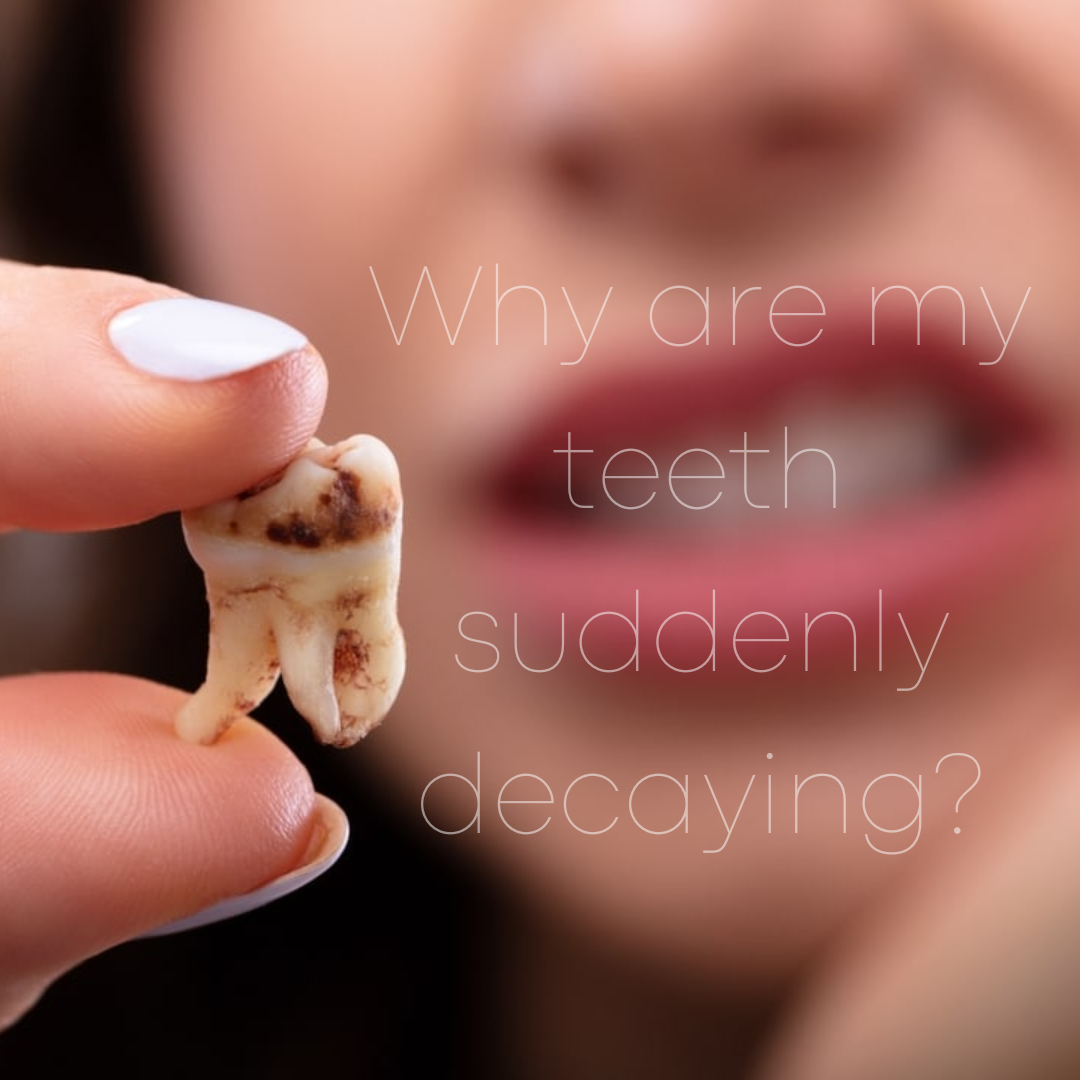Why are my teeth suddenly decaying?

Why
are my teeth suddenly decaying?
Cavities
are tiny holes or openings in the hard surface of your teeth that are eternally
damaged. Cavities, also known as tooth decay or caries, are brought on by a
number of things, including oral bacteria, frequent eating, consuming sugary
beverages, and inadequate tooth cleaning.
One
of the most prevalent health issues worldwide is dental decay, which includes
cavities. Particularly prevalent among kids, teenagers, and elderly people.
However, cavities can affect everyone who has teeth, even young children.
If
left untreated, cavities get larger and harm your teeth's deeper layers. They
may result in tooth loss, an infection, and excruciating dental pain. Your best
defence against cavities and tooth decay is systematic dental appointments and
good brushing and flossing practices.
Symptoms
Depending
on the size and location of the cavity, there are different signs and symptoms.
You might not have any symptoms at all while a cavity is just getting started.
As the degradation spreads, it may result in the following signs and symptoms:
Toothache, sudden pain, or pain that develops for no clear reason
- sensitive teeth
- When
eating or drinking anything sweet, hot, or cold, there may be mild to severe
pain.
- Your
teeth have any obvious divots or pits
- A
brown, black, or white stain on any tooth surface.
- When
you bite down, it hurts
When
to go to the dentist
A
cavity could be developing without your knowledge. Even when your mouth feels
fine, it's still necessary to undergo regular dental exams and cleanings. However, if
you have tooth pain, schedule an appointment with your dentist right away.
Causes
Tooth
decay, a gradual process, is what leads to cavities. Here is how dental
degeneration progresses:
- a) Plaque develops -
Your
teeth are covered in a transparent, corrosive layer called dental plaque. It
results from eating a lot of carbohydrates and starches and neglecting to
properly brush your teeth. When carbohydrates and sugars aren't removed from
your teeth, bacteria start to feed on them and plaque is soon formed. Tartar is
created when plaque that remains on your teeth hardens beneath or above your
gum line (calculus). Tartar acts as a barrier for germs and makes plaque removal more challenging.
- b) Plaque
assaults -
The
minerals in the hard, outer enamel of your tooth are removed by the acids in
plaque. Cavities start as microscopic openings or holes in the enamel brought
on by this degradation. The germs and acid can reach the dentin, the next layer
of your teeth, if portions of the enamel have been worn away. Compared to enamel,
this layer is softer and less acid resistant. Sensitivity is brought on by
small tubes in the dentin that connect directly to the tooth's nerve.
- c) The destruction goes on
The bacteria and acid that cause tooth decay keep migrating along the inner tooth material (pulp), which is home to nerves and blood vessels, as tooth decay progresses. The bacteria causes swelling and irritation of the pulp. Inside a tooth, there is nowhere for the swelling to grow, thus the nerve is squeezed and hurts as a result. Even the bone outside the tooth root may experience discomfort.
Risk Aspects
Everyone
who has teeth is susceptible to developing cavities, but the following things
can make it more likely:
- 1. dental
position. Your back teeth are more susceptible to decay (molars and premolars).
These teeth feature several roots, pits, and crannies as well as numerous
grooves that can catch food debris. They are therefore more difficult to
maintain than your front teeth, which are smoother and easier to access.
- 2. Specific foods and beverages. Those
that stick to your teeth for a long period, such dry cereal, chips, milk, ice
cream, honey, sugar, soda, dried fruit, hard candies, and mints, are more
likely to rot your teeth than foods that are quickly removed by saliva.
- 3. Regular snacking or drinking.
Consistently snacking or consuming sugary beverages encourages oral bacteria to
create acids that damage and erode your teeth. Additionally, drinking soda or
other acidic beverages all day long contributes to the continuous acid bath
that forms on your teeth.
- 4. Infant feeding during night. When
milk, formula, juice, or other sugar-containing liquids are placed in baby
bottles at bedtime, the liquids stay on the baby's teeth for hours while they
sleep, feeding bacteria that causes tooth rot. This harm is frequently referred
to as baby bottle tooth rot. When children wander around consuming these
beverages from a sippy cup, same harm may result.
- 5. Unsatisfactory brushing. Plaque builds
quickly on the teeth after eating and drinking, and the early stages of decay
might start if you don't brush them right away.
- 6. getting insufficient fluoride.
Fluoride, a mineral that occurs naturally, aids in the prevention of cavities
and can even repair minor tooth damage. Fluoride is added to many public water
systems due of its benefits for teeth. In addition, it is frequently found in
toothpaste and mouthwash. But fluoride is typically absent from bottled water.
- 7. older or younger. Cavities are
frequent in young toddlers and teenagers in the United States. Also more at
risk are older folks. When gums and teeth deteriorate over time, teeth become
more susceptible to root decay. Additionally, older people may take more drugs
that inhibit saliva production, raising the risk of tooth decay.
- 8. mouth arid Saliva helps prevent dental
decay by washing away food and plaque from your teeth, which is why dry mouth
is brought on by a lack of it. Salivary
substances also work to neutralize the acid that bacteria create. By
lowering saliva production, some prescription treatments, medical conditions,
radiation to the head or neck, and chemotherapy therapies can raise your risk
of cavities.
- 9. worn-out dental implants or equipment.
Dental fillings may become brittle, start to degrade, or form jagged edges over
time. Plaque might accumulate more readily as a result, which makes it more
challenging to remove. Dental appliances
that no longer fit properly can start to deteriorate.
- 10 Heartburn.
Stomach acid can reflux into your mouth as a result of heartburn or
gastroesophageal reflux disease (GERD), eroding away your teeth's enamel and seriously
harming your teeth. By exposing more of the dentin to bacterial attack, this
increases the risk of tooth decay. Your dentist could advise you to see a
doctor to determine whether your enamel
loss is being caused by stomach reflux.
- 11. eating
problems. Significant teeth erosion and cavities can result from anorexia and
bulimia. Purging causes stomach acid to repeatedly wash over the teeth, eroding
the enamel. Saliva production might also be hampered by eating problems.
Prevent
the occurrence
You
can prevent cavities and tooth decay
by maintaining good oral and dental hygiene. Here are some recommendations for avoiding cavities. Ask your dentist which advice is most
appropriate for you.
- 1 Fluoride toothpaste should be used
after eating or drinking. Ideally, you should brush your teeth after each meal
and at least twice a day if possible. Use floss or an interdental cleaner to
clean in between your teeth.
- 2. Wash your mouth out. Your dentist
could suggest using a fluoride-containing mouthwash if they believe you have a
high risk of getting cavities.
- 3. Go to the dentist frequently. Regular
oral examinations and expert teeth cleanings might help you avoid problems or
identify them early. Your dentist can advise you on the optimal schedule.
- 4. Think about dental sealants. A
protective plastic covering known as a sealant is put to the chewing surface of
back teeth. It blocks off nooks and crevices where food tends to gather, shielding
tooth enamel from acid and plaque. All children who are of school age should
get sealants, according to the Centers for Disease Control and Prevention
(CDC). Sealants should be tested frequently and may last for several years
before needing to be changed.
- 5. water from the tap, please. Fluoride
has been added to the majority of public water systems, which can greatly
prevent tooth decay. You won't receive the benefits of fluoride if you solely
consume bottled water that is fluoride-free.
- 6. Don't eat or drink frequently. Your
mouth bacteria produce acids that can erode tooth enamel whenever you eat food
or consume liquids other than water. Your teeth are always being attacked if
you snack or drink throughout the day.
- 7. Foods that are good for your teeth
should be consumed. Certain meals and drinks are healthier for your teeth than
others. Avoid eating things that remain in the ridges and crevices of your
teeth for a long time, or brush right away. However, foods like raw fruits and
vegetables and unsweetened coffee, tea, and sugar-free gum promote increased
salivation and aid in the removal of food debris.
- 8. Think about fluoride applications. If
you don't consume enough fluoride through fluoridated drinking water and other
sources, your dentist may advise regular fluoride treatments. If your risk of tooth decay is really high, he or she
might also suggest special trays that fit over your teeth for the application of
prescription fluoride.
- 9. Check out the antibacterial remedies.
Your dentist may suggest certain
antibacterial mouth rinses or other treatments to help reduce the amount of harmful bacteria in your mouth if you
are particularly susceptible to tooth
decay, such as because of a medical condition.
- 10. Combination
therapies. The risk of cavities can
be decreased by chewing xylitol-based gum, taking prescription fluoride, and
using an antibacterial rinse.
Recent Posts
Cokion
Cokion Private Limited is an Indian multinational technology company focusing on e-commerce, technology services, online advertising & marketing, headquartered in Bengaluru, Karnataka, India. It has its subsidiary, Cokion Inc., headquartered in Albany, New York, USA.
Welcome to Cokion com., the ultimate online shopping destination tailored for the diverse needs of consumers across the world. At Cokion.com, we pride ourselves on providing a seamless and enjoyable e-commerce experience, offering a wide range of products and services to meet the unique preferences of our customers.
Key Features:
Extensive Product Selection: Discover a vast array of products ranging from electronics and fashion to home goods and more. Cokion.com curates a diverse collection to cater to every aspect of your lifestyle.
User-Friendly Interface: Our intuitive and user-friendly platform ensures a smooth navigation experience. Effortlessly browse through categories, find detailed product information, and enjoy a hassle-free shopping journey.
Secure Transactions: Your security is our priority. Cokion.com employs state-of-the-art encryption and security measures to safeguard your personal information and facilitate secure transactions.
Fast and Reliable Delivery: Enjoy prompt and reliable delivery services across the world. Cokion.com. is committed to ensuring your purchases reach you in a timely manner, enhancing your overall satisfaction.
Responsive Customer Support: Our dedicated customer support team is ready to assist you with any inquiries or concerns. Reach out to us via various channels, and we'll strive to provide swift and effective solutions.
Exclusive Deals and Promotions: Benefit from exciting promotions, discounts, and exclusive deals regularly offered on Cokion.com. Save more while enjoying the quality and convenience of our e-commerce platform.
Mission Statement:
At Cokion.com, our mission is to redefine the online shopping experience for our customers. We aim to become the go-to destination for individuals seeking quality products, exceptional service, and a platform that understands and meets your evolving needs.










